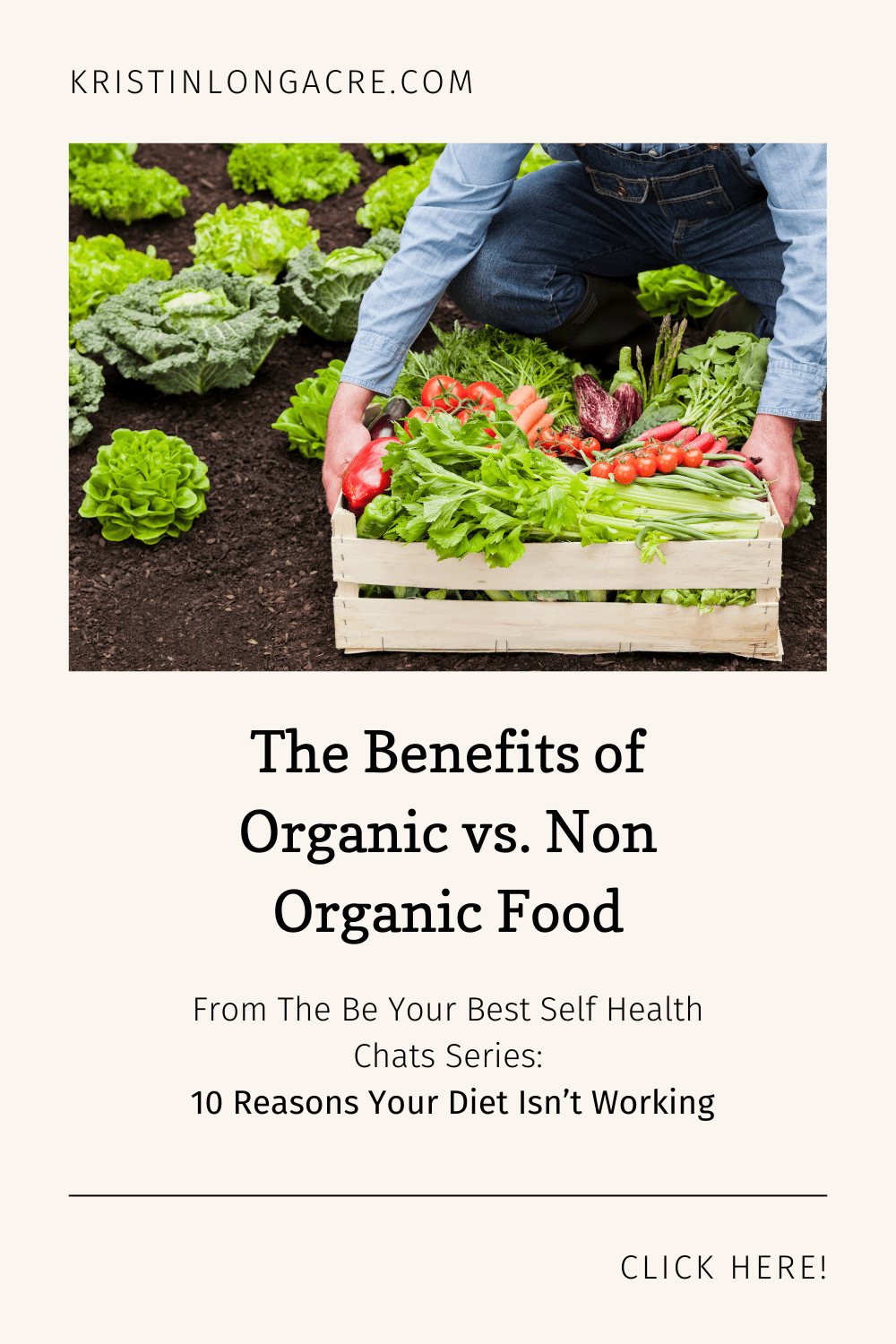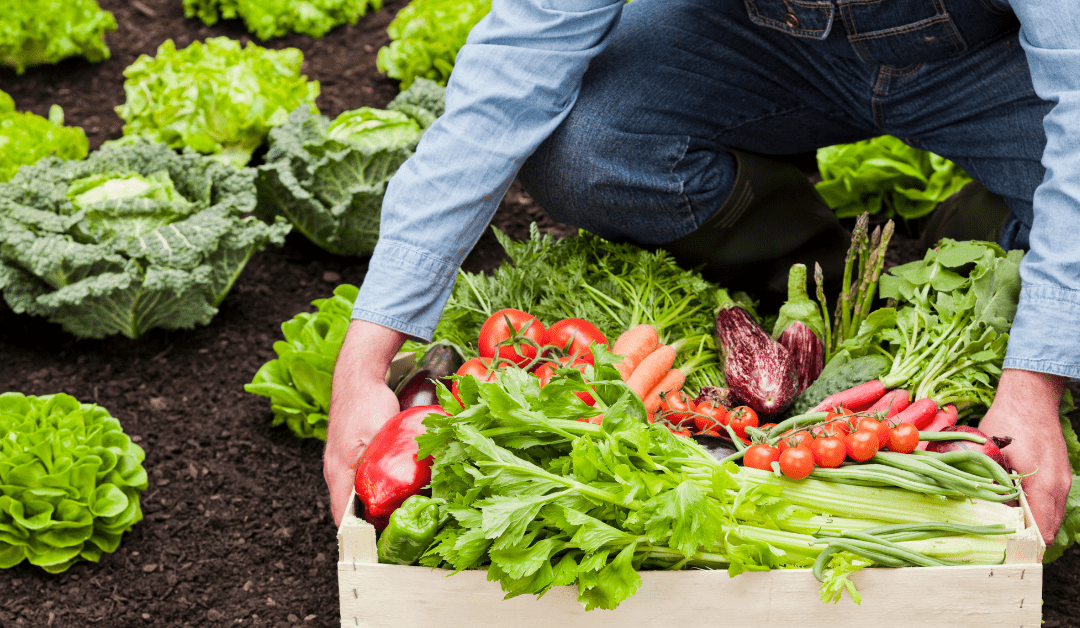No, I’m not going to tell you that you have to eat all organic all the time, but I do want to talk about the benefits of organic food this week. Depending on where you are on your health (and life) journey, there is a balance that needs to be had. We have a few more things to chat about first so let’s dive in.
Quality vs. Quantity
Before we get too far into it, let’s talk bout the different types of quantity. Technically speaking if you’re on a weight loss journey, it’s going to come down to these four numbers.
Calories, Carbs, Fats & Proteins.
Calories by definition are the measurement of the energy content of food.
Carbs are your body’s number one energy source
Fats support cell function & help with energy
Protein is there to help with your body’s maintenance and building of muscle tissue.
Calorie tracking can only take you so far. Two people could eat two different diets at 1600 calories and see drastically different results. Similar things can happen with macros. I’m not here to rule either of those situations out, there are people who have wonderful success with both. However, it goes deeper than the numbers.
100 Calorie Packs & Other Processed Foods
Let’s talk about an example of where processed foods can make things confusing.
If you are on a weight loss journey and trying to hit let’s say 1600 calories a day because that’s what your tracking app tells you to use… the best case scenario is that you would be able to fit 3 meals and 2 snacks into that calorie range.
However, some things you want to be eating (avocados, apples, mangos, bananas) are over 100 calories each, and that’s a lot to sacrifice for part of a snack. But that 100-calorie pack of pretzels fits the exact calorie amount you need.
Here’s where things get tricky. Which one is going to fill you up more, provide more nutrition, and ultimately help you lose that weight?
Your answer… the fruit or vegetable. That 100-calorie pack might satisfy a salt craving but chances are, you’ll still be hungry later.
This is so important to pay attention to when you are working on your health.
In theory, calories in, and calories out will help you lose weight. Had you stuck with the apple & maybe some peanut butter for 150-200 calories, you might be satisfied, but if you reach for that 100-calorie pack you are going to eat more probably take you past that 200 mark.
In no way am I saying pretzels are a bad snack but in this situation, they are very much a less helpful snack than an apple.
The quantity of the food you are eating effects not only your hunger levels but also whether you are getting any value from it. We need that food to fuel us and support our goals. Choosing quick pre-made snacks over a vegetable or fruit can be a huge difference in us actually seeing results.
The Benefits of Organic vs. Non-Organic Food
I will add a disclaimer here I buy a very mixed amount of organic and non-organic for a number of reasons… number one is budget and availability. I am NOT here to judge if you choose not to buy organic, I just want to keep you as informed as possible!
Now we can get into the benefits of organic vs. non-organic food. This is a hot topic and there are a lot of people who have strong opinions about it.
Is organic better for your health overall? Absolutely.
Is it always reasonable to buy organic? No.
Let’s start by answering the question, why would you want to buy organic meat or produce? At the highest level, organic means that natural pesticides or no pesticides were used on produce, and no hormones/steroids are used on the meat.
Pesticides are a huge piece of keeping farms rolling, obviously, they keep bugs and other pests off of the crops, which ultimately is then on the fruits. There is a reason that I will ALWAYS preach to wash your fruits and veggies before eating them. You still need to wash organic produce as well, but for different reasons.
Then there’s the meat side of things. In order to produce more meat, animals are often given hormones. That makes sense, right? Bigger the animal, the more meat it produces. However, those hormones don’t just disappear when the meat is packaged up and put in the store… it’s still there.
What Effect Can Non-Organic Food Have On Your Body?
What can these additives (hormones and pesticides) affect in your body? Hormones and Gut health. Which actually go hand in hand.
If you are adding animal hormones into your body, it is similar to adding synthetic hormones into your body. This is why a lot of women specifically can be encouraged by holistic doctors to switch to a more organic diet when focusing on starting a family, especially if they are struggling to conceive.
Pesticides can also wreak havoc on your hormones. Your body doesn’t know what to do with it, it thinks it’s food, does it break it down, does it send it to your body to help fuel it, what does it do? It’s not natural.
What Does Organic Food Have To Do With Weight Loss?
When your gut or hormones aren’t happy, your body can be left confused. It might hold onto a little more water weight, it might use its energy trying to break down these added substances instead of breaking down the fats that it needs to.
It won’t make or break your diet, but if you’re finding yourself stuck on a plateau and you’re already working WITH your body on other stuff, it’s worth giving organic food a try.
At the end of the day, yes calories in and calories out matter… how much of each macro you eat matters… but not as much as listening to your body and making sure you’re feeding it HIGH-QUALITY foods.
Quality vs. Quantity. Both are important in their own way.
ABOUT ME

Hey There, I’m Kristin, a gluten-free nutrition coach helping gluten-free families adjust to their new lifestyle.






